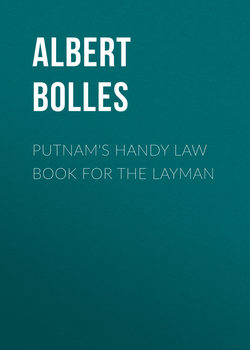Putnam's Handy Law Book for the Layman

Реклама. ООО «ЛитРес», ИНН: 7719571260.
Оглавление
Bolles Albert Sidney. Putnam's Handy Law Book for the Layman
FOREWORD
Putnam's Handy Law Book for the Layman
Legal Forms for Everyday Use
1. Agreement for Sale of Land
2. Agreement Concerning Party Wall
3. Agreement for Building
4. Claim of Lien by Workman of Sub-Contractor
5. Agreement for Work and Labor
6. Bond to Perform a Contract
7. Bill of Sale
8. Bill of Sale – Shorter Form
9. Warranty Deed
10. Warranty Deed in Common Use in New England
11. Deed of Indenture – Short Form
12. Quit Claim Deed
13. Quit Claim Deed – Another Form
14. Quit Claim Deed – Short Form
15. Mortgage
16. Mortgage with Power of Sale
17. Chattel Mortgage with Power of Sale
18. Mortgage on Goods and Chattels – Another Form
19. Notice of Sale under Chattel Mortgage
20. Assignment of Mortgage
21. Agreement for Lease
22. Lease
23. Lease – Another Form. Landlord and Tenant's Agreement
24. Farm Lease
25. Lease of Furnished Rooms
26. Assignment of Lease
27. Assignment of Lease – Another Form
28. Notice to Quit
29. Subscription to Build a Church
30. Power of Attorney
31. Power of Attorney to Transfer Stock
32. Certificate of Stock
33. Agreement to Sell Shares of Stock
34. Transfer of Shares of Stock
35. Assignment of Policy of Insurance
36. Assignment of Patent Right
37. Bond for Payment of Money
38. Articles of Co-Partnership
39. Articles of Co-Partnership – Another Form
40. Letter of Credit
41. Agreement for Sale of Physician's Practice
42. Agreement Between Merchant and Traveling Salesman
43. Agreement for the Adoption of Children
44. Release by Ward of His Guardian
45. Will
46. Will – Another Form
47. Will Bequeathing Legacies and Appointing Residuary Legatee
48. Articles of Incorporation
Отрывок из книги
Explanation of Terms.– At the outset the explanation of a few terms, often used, may be helpful to the reader. Among these are the terms statute and common law. Statute law or statutes mean the laws enacted by the state legislature and by the federal congress. Common law means the decisions made by the state and federal courts. These decisions may relate to the interpretation and application of statutes, or to the application of former decisions or precedents, or to the qualification and application of them, or to the making and application of new rules or principles where none exist that are needed to decide the case in hand.
It is a rule of the most general application that legal decisions are precedents which are to be followed in other cases of the same character. The decisions of the highest court in each state must be followed by the lower courts, but no courts in any state are obliged to follow the decisions of the courts in any other state. The courts in every state must also follow the decisions of the federal courts in all matters of a national character. Thus if a federal court decides the meaning or interpretation of a federal statute, a state court must follow the interpretation in a case requiring the application of that statute.
.....
Only a creditor who owns a demand or provable claim can vote at creditors' meetings. Nor can other creditors through filing objections to a claim prevent a bona fide claimant from voting. A creditor of an individual member of a bankrupt partnership cannot vote. Nor can creditors holding claims that are secured or that have priority vote only to a limited extent, so far as their claims are on the same basis as other creditors. To entitle secured and preferred creditors to vote at the first meeting on the whole of their claims, they must surrender their securities or priorities. If a portion of a creditor's debt is secured and a portion is unsecured, he may vote on the unsecured portion. An attorney, agent, or proxy may represent and vote at creditors' meetings, first presenting written authority, which must be filed with the referee. The referee who presides at the first meeting makes up or decides on its membership. Matters are decided at the meeting by a majority vote in number and amount of claims of all the creditors whose claims have been allowed and are present.
The next stage in bankruptcy proceedings is the proving and allowance of claims. Only such debts are provable as existed at the time of filing the petition. Every debt which may be recovered either at law or in equity may be proved in bankruptcy. A claim barred by the statute of limitations is not provable, nor is a contingent liability. On the other hand a debt founded on a contract express or implied may be proved, for example, damages arising from a breach of a contract prior to the adjudication in bankruptcy. Again, if there are agreements or covenants in a contract of a continuing character the bankrupt is still liable on them notwithstanding his discharge in bankruptcy. If the amount of a claim is unliquidated the act sets forth the mode of proceeding. Among other claims that may be proved are judgments, debts founded on an open account, and rents.
.....